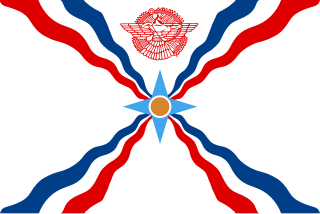
Assyrians are an indigenous ethnic group native to Mesopotamia, a geographical region in West Asia. Modern Assyrians descend from Ancient Mesopotamians such as ancient Assyrians and Babylonians, originating from the ancient indigenous Mesopotamians of Akkad and Sumer, who first developed the civilisation in northern Mesopotamia that would become Assyria in 2600 BCE. Modern Assyrians may culturally self-identify as Syriacs, Chaldeans, or Arameans for religious, geographic, and tribal identification.

Tur Abdin is a hilly region situated in southeast Turkey, including the eastern half of the Mardin Province, and Şırnak Province west of the Tigris, on the border with Syria and famed since Late Antiquity for its Christian monasteries on the border of the Roman Empire and the Sasanian Empire. The area is a low plateau in the Anti-Taurus Mountains stretching from Mardin in the west to the Tigris in the east and delimited by the Mesopotamian plains to the south. The Tur Abdin is populated by more than 80 villages and nearly 70 monastery buildings and was mostly Syriac Orthodox until the early 20th century. The earliest surviving Christian buildings date from the 6th century.
Turoyo, also referred to as Surayt, or modern Suryoyo, is a Central Neo-Aramaic language traditionally spoken in the Tur Abdin region in southeastern Turkey and in northern Syria. Turoyo speakers are mostly adherents of the Syriac Orthodox Church, but there are also some Turoyo-speaking adherents of the Assyrian Church of the East and the Chaldean Catholic Church, especially from the towns of Midyat and Qamishli. The language is also spoken throughout diaspora, among modern Assyrians/Syriacs. It is classified as a vulnerable language. Most speakers use the Classical Syriac language for literature and worship. Turoyo is not mutually intelligible with Western Neo-Aramaic, having been separated for over a thousand years; its closest relatives are Mlaḥsô and western varieties of Northeastern Neo-Aramaic like Suret.
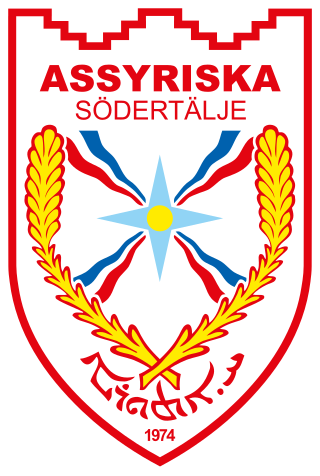
Assyriska Fotbollsföreningen, also known simply as Assyriska FF, is a Swedish football club based in Södertälje, Stockholm County. The club, formed in 1974 by Assyrian immigrants, has advanced through the league system and is currently playing in the fourth highest Swedish league, Division 2. They played in the highest Swedish football league Allsvenskan in 2005 where their games were broadcast in over 80 countries. The club has also played a final in Svenska Cupen, which was lost against IF Elfsborg in 2003.

The Assyrian diaspora refers to ethnic Assyrians living in communities outside their ancestral homeland. The Eastern Aramaic-speaking Assyrians claim descent from the ancient Assyrians and are one of the few ancient Semitic ethnicities in the Near East who resisted Arabization, Turkification, Persianization and Islamization during and after the Muslim conquest of Iraq, Iran, Syria and Turkey.

Nuri Kino,, is a Swedish-Assyrian award-winning investigative journalist, documentary filmmaker, author and human rights expert. He is the author of several nonfiction books, and hundreds of stories and reports from the Middle East, western and eastern Europe as well as Africa over the past two decades. He has won awards for his reporting on human-rights issues, and is the founder of human rights organization A Demand For Action (ADFA) which advocates for persecuted minorities in Iraq, Syria, Turkey and elsewhere in the Middle East.
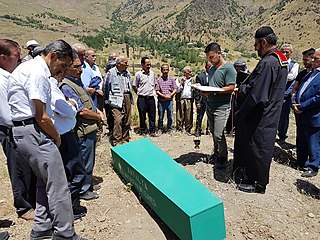
Assyrians in Turkey or Turkish Assyrians are an indigenous Semitic-speaking ethnic group and minority of Turkey who are Eastern Aramaic–speaking Christians, with most being members of the Syriac Orthodox Church, Chaldean Catholic Church, Assyrian Pentecostal Church, Assyrian Evangelical Church, or Ancient Church of the East.
German Assyrians are Germans of Assyrian descent or Assyrians who have German citizenship. The Assyrians in Germany mainly came from Azerbaijan, Turkey, Jordan, Syria, Iraq and Iran.

Syrianska IF Kerburan is a Swedish based football club in the city of Västerås. The club, formed in 1977 by Aramean (Syriac) immigrants, has advanced through the league system and is currently playing in the fourth highest Swedish league, Division 2.
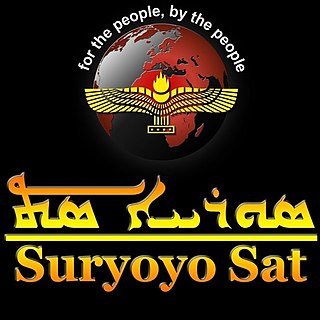
Suryoyo Sat is an Aramaic language TV channel broadcasting from Södertälje, Sweden. The channel is broadcast to more than 80 countries.

Terms for Syriac Christians are endonymic (native) and exonymic (foreign) terms, that are used as designations for Syriac Christians, as adherents of Syriac Christianity. In its widest scope, Syriac Christianity encompass all Christian denominations that follow East Syriac Rite or West Syriac Rite, and thus use Classical Syriac as their main liturgical language. Traditional divisions among Syriac Christians along denominational lines are reflected in the use of various theological and ecclesiological designations, both historical and modern. Specific terms such as: Jacobites, Saint Thomas Syrian Christians, Maronites, Melkites, Nasranis, and Nestorians have been used in reference to distinctive groups and branches of Eastern Christianity, including those of Syriac liturgical and linguistic traditions. Some of those terms are polysemic, and their uses have been a subject of terminological disputes between different communities, and also among scholars.

Assyrian nationalism is a movement of the Assyrian people that advocates for independence or autonomy within the regions they inhabit in northern Iraq, northeastern Syria, northwestern Iran, and southeastern Turkey.
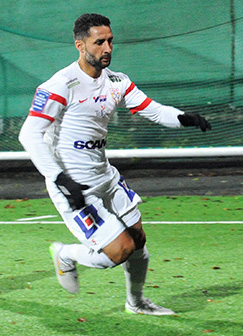
David Durmaz is a Swedish-Assyrian footballer who plays as a defender for Assyriska FF.

Syrianska Football Club, also known as Syrianska FC or simply Syrianska, is a Swedish professional football club based in Södertälje in Stockholm County. The club was founded by Syriac-Aramean immigrants in 1977 as Suryoyo Sportklubb, or Suryoyo SK. In 1986, its name was changed to Syrianska SK. The club adopted its present name as it grew and advanced through the league system. In 2010, after two years in Superettan, Syrianska was promoted to Allsvenskan for the first time in club history. This made Syrianska FC the 61st team to play in Allsvenskan. Since the Syriac people do not have an official national team, Syrianska is often seen as a substitute.
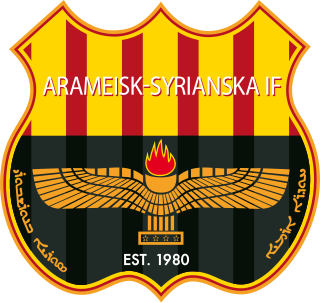
Arameisk-Syrianska IF is a Swedish based football club in Botkyrka, a suburb of Stockholm. The club was formed as Arameiska-Syrianska KIF by Syriacs (Arameans) in 1980 and has advanced through the league system, currently (2017) playing in the third highest Swedish league, Division 1. In 2008, the club used the name Syrianska Botkyrka IF after having concluded a cooperation with Botkyrka municipality in early 2008. The club has previously been called Arameiska-Syrianska KIF and Syrianska Botkyrka IF, but is now known as Arameisk-Syrianska IF.
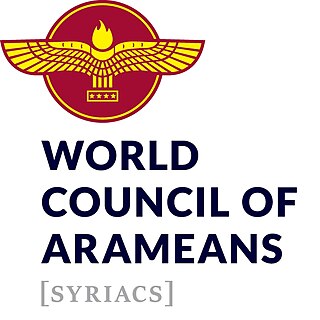
World Council of Arameans (Syriacs), previously known as the Syriac Universal Alliance (Syriac: ܚܘܝܕܐ ܣܘܪܝܝܐ ܬܒܝܠܝܐ, romanized: Ḥuyōdō Suryōyō Tbelōyō), is an international non-government umbrella organization, whose membership consists of several national associations, representing Arameans (also known as Syriac) from various countries around the world. Position of the SUA/WCA president is regarded as representative within Aramean/Syriac community. Since 2009, the organization is presided by Johny Messo.
Bahro Suryoyo is a magazine founded in 1979 by the Syriac (Aramean) Federation of Sweden in Sweden It is published in five languages: Swedish, Aramaic, Arabic, English, and Turkish. It is available as an online magazine since 2009 at bahro.nu.

The Aramean flag or Syriac-Aramean flag is the ethnic flag designated for the Arameans, intended to represent their nation and homeland as well as the Aramean diaspora. A first version, similar to the current one, was developed in 1980 by Bahro Suryoyo, a Syriac-Aramean journal part of the Syriac federation in Sweden. The current version was developed in early 1982.
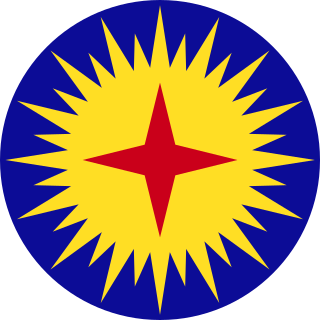
Dawronoye is a secular, leftist, national liberation movement among the Assyrian people. Ideologically characterized by progressive ideas and including socialist elements, its founding roots can be traced to the late 1980s in the town of Midyat in Turkey. The modern manifestation of the movement is controversial among Assyrian organizations worldwide, particularly due to its ties to the Kurdistan Workers' Party (PKK) and the Democratic Union Party (PYD).





















